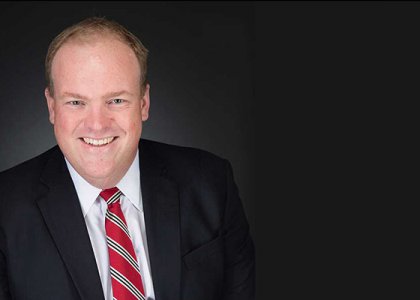
Carving a niche in the hockey world
By Ryan Van Horne in the Faculty of Law’s Hearsay Magazine.
John Sedgwick (LLB’04) took the road less travelled by most law school graduates when carving his career path. First he worked with the general corporate services group with McInnes Cooper in Halifax and then he stepped up to the big leagues when he learned about a job at the National Hockey League through a former classmate at Acadia who was working with the league.
But, unlike the narrator in Robert Frost’s poem, “The Road Not Taken”, Sedgwick made his decision with conviction. He left Halifax in October 2006 to follow his passion for hockey and take a job as manager of hockey operations with the National Hockey League’s Hockey Operations Department in his hometown of Toronto.
In leaving the world of corporate insolvency and liquidating banks, he joined the NHL’s “War Room.” Located high above the Air Canada Centre on the 11th floor of the NHL’s Toronto office, it is the league’s centralized video replay room where every minute of every game is monitored for penalties, goals and other close plays. It was here where Sedgwick did video review, player discipline, and learned the ins and outs of the league’s complex salary cap.
Even though it was an entry-level job, he worked there for six-and-a-half years. He learned a great deal and impressed his bosses, who realized he was ready for a different role, one that required him to use more of his legal skills. They helped get his name out there and in the mix for jobs like the one he landed in Montreal.
The Canadiens
Even though Sedgwick hadn’t practised law since his brief stint with McInnes Cooper in Halifax, in 2013 the Montreal Canadiens hired him to be their director of legal affairs. “They approached me,” said Sedgwick. “The hockey world is small.”
While with the NHL, Sedgwick made many contacts: within the NHL head office, with player agents, and with front-office staff from the league’s 30 teams. He learned about the players and became familiar with their salaries. These relationships and this knowledge make Sedgwick a go-to guy for the Canadiens’ general manager Marc Bergevin. He is sometimes called the team’s “capologist,” a crucial role for understanding the value of players involving salary cap analysis, contract negotiations and collective bargaining.
Ben Durnford (’00), a partner at McInnes Cooper and Sedgwick’s friend and mentor, said he was “incredulous” when he learned Sedgwick was leaving the “dream job” with the NHL to take an impressive role with hockey’s most venerable franchise.
According to Durnford, Sedgwick is a smart guy and could have made a solid career practising law in Nova Scotia if he wanted to, but it was his other traits that made him stand out and helped him rise in the hockey world.
“He has unparalleled people skills,” Durnford said. “The sense of humour and boost to the team morale that John brought to his time at McInnes Cooper carried considerable value. This value is difficult to quantify, because commodities like that are rare.”
Dalhousie Days
“Dal, for me, was an easy choice,” Sedgwick said. “I loved my time at Dal and the amazing part was that there was someone from every part of the country in our class. That isn’t as common in some of the Ontario schools.”
Some of his fondest memories at Dal were hockey-related. He played for the Law Dogs, a hockey team of law students that played in an intramural league at Dalhousie and against a team of law students from the University of New Brunswick.
Sedgwick comes from a family of lawyers and followed his parents to Dalhousie. Sedgwick’s mother, Libby Burnham, graduated from the Law School in 1963 and received the school’s Weldon Award for public service in 2001. She is now the chancellor at Acadia University, where John graduated with a BA in 2001.
Sedgwick’s father, George Gordon Sedgwick, was a Bay Street lawyer with Borden Ladner Gervais before becoming a Superior Court judge in Ontario. He spent a year at Dalhousie before transferring to Queen’s.
Team Player
When asked what position on the team he would compare his off-ice role to, Sedgwick was reluctant to compare. “The players have very specialized talents,” he said. “I think that would be overstating my significance.” If anything, however, he said he’s like an assistant coach, there to provide support and a workable solution to a variety of problems that might arise.
“I figure out how to put people’s good ideas into action and I’m responsible for not letting things slip through the cracks,” said Sedgwick. Normally, Sedgwick eschews the limelight directed at the team’s executives and prefers it that way.
Durnford said when he visited Sedgwick in Montreal last fall the two friends were walking by players in the team’s inner sanctum after a game. “It came as no surprise that he was greeted with ‘Hey Sedgie’ from many of the players, showing that he’s earned the respect of the team,” says Durnford. “I can think of no one else who becomes ‘just one of the guys’ quicker or more easily than my friend, John Sedgwick. Is higher praise available?”
Given the ease with which Sedgwick assimilates himself in new environments, and how one road leads to another, it’s likely Sedgwick will discover new paths that diverge from the one he’s already chosen. And if they happen to appear less trodden, he might accept that as a challenge rather than an obstacle.
